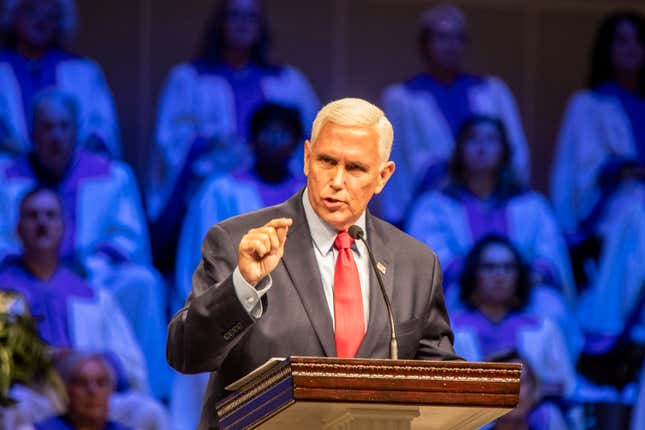
Former Vice President Mike Pence visited a South Carolina church Wednesday to make remarks on the “Post-Roe World,” according to ABC 15 News. Most reports catch the pro-birth statements he made but in one TikTok video of his speech he actually said something not completely out of left field.
“If you’re gonna be pro-life, you need to be pro-adoption. The cost to adopt a child in the United States can be as much as $70,000 to the family. It should not cost the average American worker more than a year’s worth of salary to adopt a child,” he said.
Pence, you’re damn right. Countless videos of people protesting outside Planned Parenthood, berating women picking up their birth control circulate the internet. The people who dare ask them if they’ve ever adopted a child tend to receive the same answer: “no” or “the only children I have are my own.”
But let’s look at this from the lens of adopting Black children. According to the Adoption Council, 35 percent of children adopted through the foster care system are Black and 27 percent of them end up living in Black households. Many of those children end up in the foster care system due to poverty.
Check out these statistics from the 2017 State of America’s Children Report:
Each day in America, 370 African American babies are born into poverty (or 135,050 per year) and 233 into extreme poverty (or 85,045 per year). The 2016 poverty threshold for one person was $12,228 in yearly income, or $24,563 for a family of four.
What exactly is extreme poverty? In this study, “extreme poverty” is defined as half of the povery threshold. Originally defined by the United Nations in 1995, extreme poverty worldwide is “a condition characterized by severe deprivation of basic human needs, including food, safe drinking water, sanitation facilities, health, shelter, education, and information. It depends not only on income but also on access to services.” Many in our country would be surprised to hear this is true in the United States—not just in third world countries.
African American children only make up 14 percent of children in our population in the U.S., but they make up 23 percent of the adopted children population.
So, a Black child may end up in foster care after being born into a poor family. Black kids made up 22 percent of the 440,000 children waiting to be adopted in 2017, per the US Department of Health and Human Services. The US Commission on Civil Rights found lighter skinned children were adopted more often. Further, Black kids end up waiting 39.4 months to get adopted, the longest out of any other race.
Mind you, it costs less to adopt a Black child than a white child… by a $20,000 difference.
And if they don’t get adopted, the poverty they were born into is what they ultimately return to once they grow out of the system. Black Adoption Matters estimated about 100,000 Black youths in the country face this issue which feeds our homeless youth crisis.
So, when we talk about being pro-life, we must acknowledge the life of the child after birth. If we want to talk about pro-adoption, we need to address the severe racial disparities Black kids experience during vulnerable, developmental stages of their life. Before you tell someone to put their unborn child up for adoption, ask yourself if you’ve ever encouraged anyone, or yourself, to adopt.

